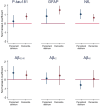Persistent delirium is associated with cerebrospinal fluid markers of neuronal injury
- PMID: 39355007
- PMCID: PMC11443447
- DOI: 10.1093/braincomms/fcae319
Persistent delirium is associated with cerebrospinal fluid markers of neuronal injury
Abstract
Delirium is associated with the risk of future long-term cognitive impairment, but the degree to which markers of neuronal injury may be distinct or shared with dementia has yet to be comprehensively described. We investigated CSF biomarkers of dementia, astrocytosis and neuronal damage in a clinical cohort with persistent delirium, comparing them with an outpatient memory clinic sample. Our aim was to determine if different patterns of biomarker changes could implicate specific mechanisms for delirium-related neuronal injury over and above that attributable to comorbid dementia. We recruited 35 participants from the Prince of Wales Hospital, Sydney, Australia. We included inpatients with delirium persisting for at least 5 days (n = 15, 10 with underlying dementia) and participants from outpatient memory clinics (n = 20, 17 with dementia). CSF assays were as follows: amyloid-β42, amyloid-β40, phosphorylated tau181, neurofilament light chain and glial fibrillary acidic protein. We used propensity score matching to estimate effect sizes for each standardized CSF biomarker separately for persistent delirium (irrespective of underlying dementia) and dementia (irrespective of superimposed delirium). Compared with individuals without delirium, persistent delirium was associated with elevated glial fibrillary acidic protein (normalized coefficient per transformed standard deviation, β = 0.85; 95% confidence interval: 0.03-1.68) and neurofilament light chain (β = 1.1; 95% confidence interval: 0.5-1.6), but not phosphorylated tau181. Compared with individuals without dementia, glial fibrillary acidic protein, neurofilament light chain and phosphorylated tau181 were all increased to expected levels in dementia cases, with the former two biomarkers at levels comparable to those seen in persistent delirium [glial fibrillary acidic protein (β = 1.54; 95% confidence interval: 1.05-2.0) and neurofilament light chain (β = 0.65; 95% confidence interval: 0.24-1.1)]. Persistent delirium was linked with changes in CSF biomarkers not necessarily attributable to dementia. These findings support the potential that delirium is associated with direct neuronal injury independent of dementia pathophysiology. Whether this neuronal injury involves astrocyte dysfunction or direct axonal damage are both possibilities. Future work examining acute brain injury in delirium is needed.
Keywords: CSF biomarkers; delirium; dementia; glial fibrillary acidic protein; neurofilament light chain.
© The Author(s) 2024. Published by Oxford University Press on behalf of the Guarantors of Brain.
Conflict of interest statement
H.Z. has served at scientific advisory boards for Eisai, Denali, Roche Diagnostics, Wave, Samumed, Siemens Healthineers, Pinteon Therapeutics, NervGen, AZTherapies and CogRx; has given lectures in symposia sponsored by Cellectricon, Fujirebio, AlzeCure and Biogen; and is a cofounder of Brain Biomarker Solutions in Gothenburg AB (BBS), which is a part of the GU Ventures Incubator Programme (outside the submitted work). The other authors declare no competing interests.
Figures




Similar articles
-
Blood biomarkers of neuronal injury in paediatric cerebral malaria and severe malarial anaemia.Brain Commun. 2023 Nov 27;5(6):fcad323. doi: 10.1093/braincomms/fcad323. eCollection 2023. Brain Commun. 2023. PMID: 38075948 Free PMC article.
-
Emergence delirium and postoperative delirium associated with high plasma NfL and GFAP: an observational study.Front Med (Lausanne). 2023 Jul 28;10:1107369. doi: 10.3389/fmed.2023.1107369. eCollection 2023. Front Med (Lausanne). 2023. PMID: 37576000 Free PMC article.
-
Association of plasma biomarkers of Alzheimer's disease and related disorders with cognition and cognitive decline: The MYHAT population-based study.Alzheimers Dement. 2024 Jun;20(6):4199-4211. doi: 10.1002/alz.13829. Epub 2024 May 16. Alzheimers Dement. 2024. PMID: 38753951 Free PMC article.
-
A data-driven disease progression model of fluid biomarkers in genetic frontotemporal dementia.Brain. 2022 Jun 3;145(5):1805-1817. doi: 10.1093/brain/awab382. Brain. 2022. PMID: 34633446 Free PMC article.
-
Tau, Glial Fibrillary Acidic Protein, and Neurofilament Light Chain as Brain Protein Biomarkers in Cerebrospinal Fluid and Blood for Diagnosis of Neurobiological Diseases.Int J Mol Sci. 2024 Jun 7;25(12):6295. doi: 10.3390/ijms25126295. Int J Mol Sci. 2024. PMID: 38928000 Free PMC article. Review.
References
-
- Pereira JV-B, Aung Thein MZ, Nitchingham A, Caplan GA. Delirium in older adults is associated with development of new dementia: A systematic review and meta-analysis. Int J Geriatr Psychiatry. 2021;36(7):993–1003. - PubMed
Grants and funding
LinkOut - more resources
Full Text Sources
